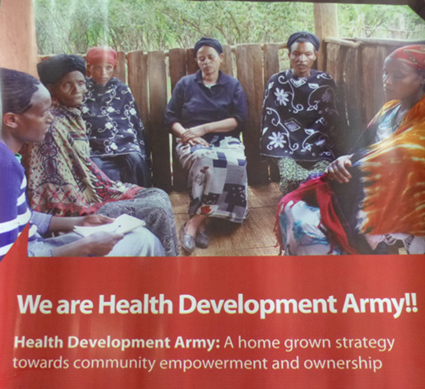6.2.2 Rural sanitation and hygiene promotion
Since 2004, the progress made in sanitation and hygiene promotion in rural areas of Ethiopia has been remarkable. For example, between 1990 and 2012 Ethiopia reduced the percentage of the population using open defecation from 92% to 37%, the highest percentage point reduction of any country in the world (JMP, 2014b). This visible progress was attributed to the establishment of a good working environment, such as by developing and applying strategies, manuals and guidelines, and also the strong commitment and collaboration of the Ethiopian government and its partners. 2004 was also marked by the launch of the Health Extension Programme (HEP), which has resulted in more than 38,000 Health Extension Workers (HEWs) deployed to rural kebelesto promote preventive health. The HEP training is structured into 16 packages, of which seven are WASH-related. Along with the HEWs, the Health Development Army (Box 6.1) established by community members has been instrumental in promoting sanitation and hygiene for their respective communities.
Box 6.1 Health Development Army
The Health Development Army (HDA) started in 2010–2011. It is one of the community-level structures established to facilitate efforts to promote primary health activities, including WASH, at grassroots level (Figure 6.4). The HDA are organised groups of families who promote healthy activities and behaviour among other families.

The HDA comprises ‘one-to-five networks’, which each consist of one model family and five other households who live nearby. Model families are early adopters of desirable health practices. They act as role models for other households and encourage them to adopt desired practices and behaviours. Households are selected for model family training based on their involvement in other development work, and on acceptance and credibility within the community.
The one-to-five networks serve as a forum for exchange of concerns, priorities, problems and decisions relating to health. These networks were designed to empower women in particular, and the family in general, in health decision making leading to democratisation of health and to community partnership. The networks are supported by the local HEWs and are responsible for the preparation and completion of plans for collecting health information, conducting weekly meetings to review progress, and submitting monthly reports.
(Adapted from Teklehaimanot and Teklehaimanot, 2013)
6.2.1 Rural water supply
